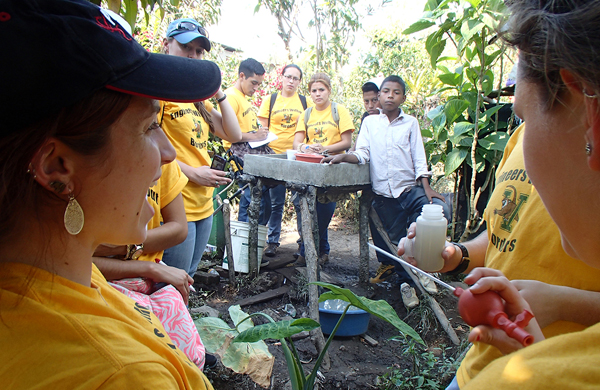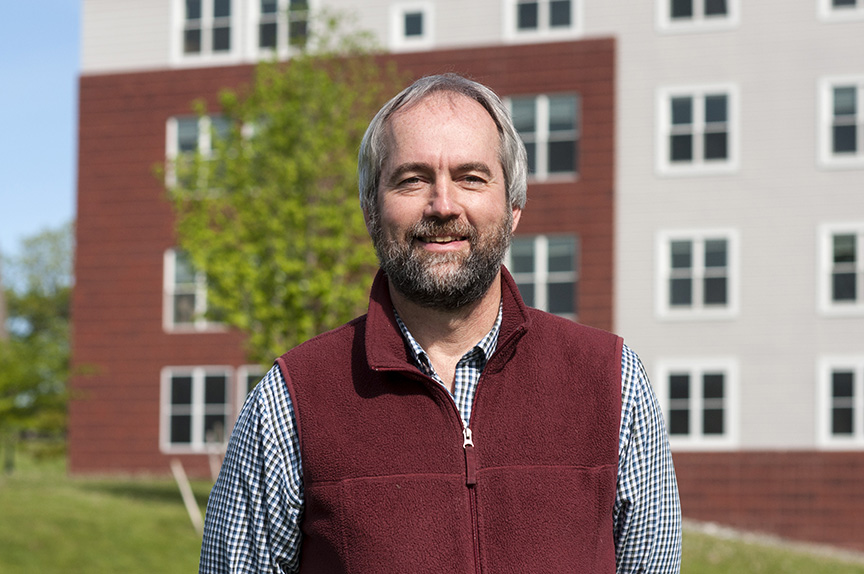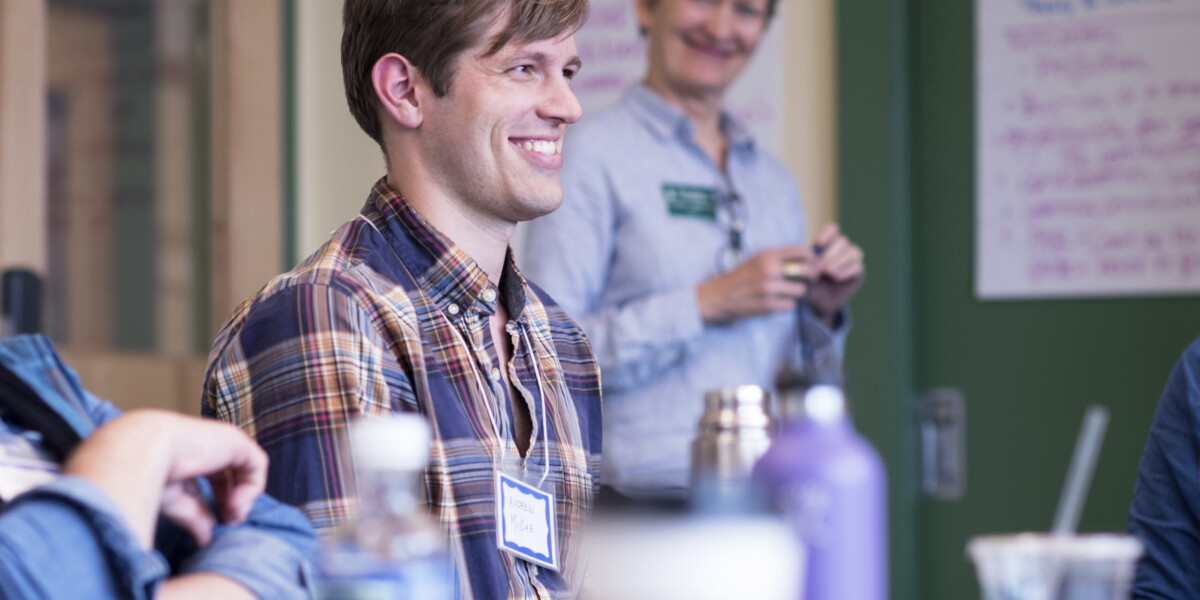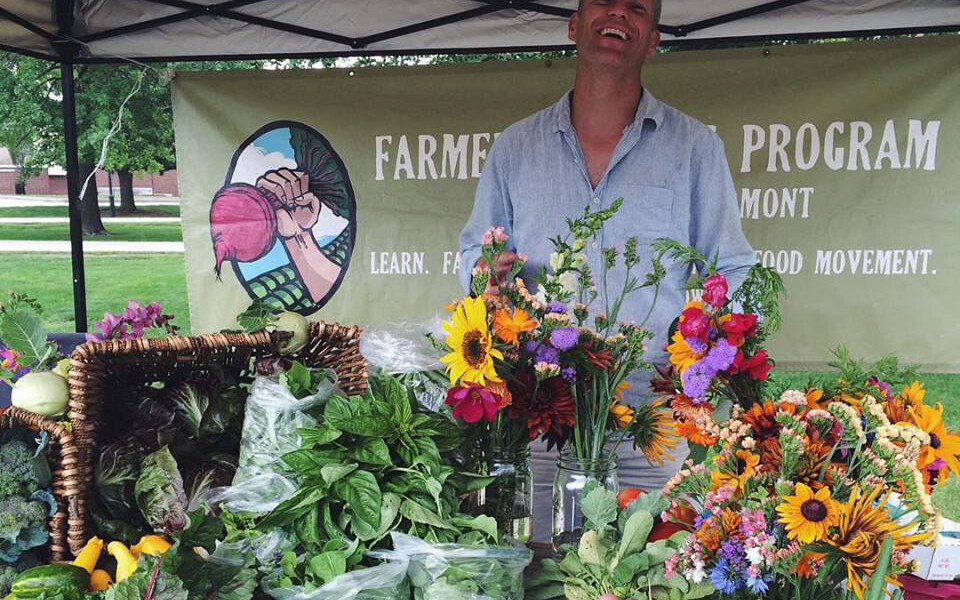By Kim MacQueen
They call it los meses de las vacas flacas – the months of the skinny cows. The phrase refers to the dry months in mountainous Nicaragua, where coffee is the principal crop. During the four rainy months of the year, coffee growers can harvest their cash crop and buy enough food to feed their families. But in the dry months, that’s much more difficult, and people often go hungry. Los meses de las vacas flacas is a time of scarcity, hardship and poverty.
Teaming with Engineers Without Borders
CEMS Dean Luis Garcia heard about the situation this year at a presentation by members of the Vermont Engineers Without Borders (VTEWB) professional chapter and Keurig Green Mountain. The two groups are working together to provide water recycling and storage ideas for plantations in Venecia, a village in northwestern Nicaragua.
Garcia found the project compelling, and in May joined a group from the Vermont EWB professional chapter and five UVM students, members of the university’s student EWB chapter, to visit Venecia and develop a student-led aspect to the water supply project that the VTEWB chapter has been working on, one designed to help coffee growers’ families grow their own food year-round.
Recycling Greywater for Food Growth
“The UVM students are looking at using greywater, generated from washing dishes and doing laundry, to water small home gardens that families could use to supplement their food supplies,” Garcia explains. “The idea is for these families to be able to grow enough food that they would have a source of income or food in the dry season – those vacas flacas months.” The student EWB team knew both problems added up to a lot of challenges, so they did a lot of research and prep work before any of them ever set foot in Nicaragua.
“We wanted to be prepared once we arrived. We did a lot of research on what was needed for water quality parameters for safe and effective reuse,” explains senior Hanna Anderson, an environmental engineering major who serves as project lead. “We took samples of the existing greywater and sent them back to UVM for testing, and we took soil samples from the home gardens to check the nutrient levels.”
 She adds that “working with EWB has given me a great opportunity to be hands-on within my major. It’s helped with my project management, networking and leadership skills, and it’s given me a chance to travel. I want to go into a water-related field, so it is geared toward what I hope to be doing in the future.”
She adds that “working with EWB has given me a great opportunity to be hands-on within my major. It’s helped with my project management, networking and leadership skills, and it’s given me a chance to travel. I want to go into a water-related field, so it is geared toward what I hope to be doing in the future.”
Anderson and fellow EWB chapter students are now in a research phase leading up to their second trip to Venecia, planned for May 2015, in an effort to recommend their cost-effective, easy-to-maintain greywater cleaning system.
“We want what is needed to be easy to obtain locally so they don’t have to rely on imports – if you had to send it from the U.S., that would be a problem long-term. Maybe we could bring some now, but what happens five years later?” Garcia says. “And it has to be economical for their standard of living.”
The EWB team is working now with Edrulfo Rodriguez, Nicaragua-based project coordinator for Asociacion para el Desarrollo Social de Nicaragua (ASDENIC), to find the most cost-effective means to implement their plans.
“The students have listened to the community needs first, before they came up with a proposal, they have shared with ASDENIC all their thoughts and ideas on how to solve the problem, and they have coordinated with us on every step of the project, which makes us feel like we are building something together,” Rodriguez says.
With some international cooperation projects, experts arrive but fail to consult the partner organization or the people who live there, he notes. “But the work with UVM students has been very different, because they have considered every idea and comment from the people of Venecia,” Rodriguez says. “They have helped encourage this community that is possible to turn a problem into an opportunity.”
Changing the Way Engineers are Seen
Student Ben Cares, a junior civil engineering major who serves as UVM’s EWB chapter president, adds to that idea.
“This project actually can change the way engineers are seen,” he says. “EWB is a glimpse into what engineering can be from a humanitarian view.”
Cares also encourages all students interested in EWB to email him at bcares@uvm.edu and get involved, whether they’re engineering majors or not. Help is needed organizing, building, planning and other areas.
 Garcia, too, has noticed EWB’s numbers are increasing, although he adds that more help, as well as recognition of these dedicated students’ work, is always welcomed.
Garcia, too, has noticed EWB’s numbers are increasing, although he adds that more help, as well as recognition of these dedicated students’ work, is always welcomed.
“I think the whole idea is that our students are understanding they can make a difference in the world,” Garcia says. “They’re realizing that some of the work that they’re doing literally could be the difference between somebody going hungry and somebody having enough food. That’s really powerful.”
This piece was originally published in the UVM of Engineering and Mathematical Sciences’ Summit Spring 2015 newsletter.





